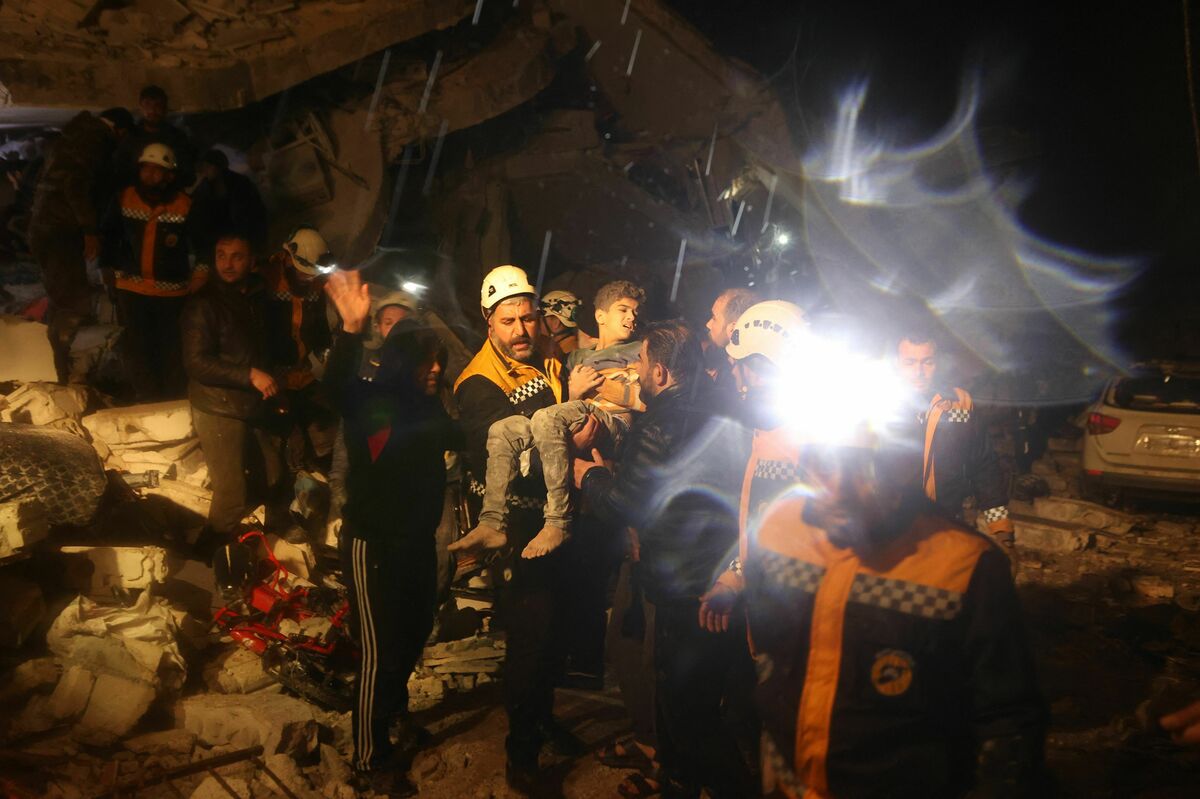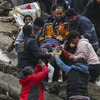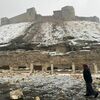
[ad_1]

Rescue employees carry a boy they recovered from the rubbles of a constructing after an earthquake in Dana, a city in rebel-held Idlib, early Monday morning.
Aaref Watad/AFP by way of Getty Images
cover caption
toggle caption
Aaref Watad/AFP by way of Getty Images

Rescue employees carry a boy they recovered from the rubbles of a constructing after an earthquake in Dana, a city in rebel-held Idlib, early Monday morning.
Aaref Watad/AFP by way of Getty Images
Much of the destruction and demise from Monday’s 7.8-magnitude earthquake in Turkey lies throughout the border in northern Syria, a area already ravaged by greater than a decade of civil battle and the myriad crises which have flowed from it.
Syrian officers have already reported a minimum of 650 individuals useless, based on the Associated Press. That quantity omits casualties within the nation’s rebel-held northwest, the place help teams estimate a whole bunch extra have died.
And because the demise toll continues to rise, residents and help teams within the nation’s northern area have described disastrous scenes of collapsed buildings, packed hospitals, determined dad and mom clutching unconscious youngsters and frantic rescue employees digging by way of rubble.
“This is the last thing people need in Syria,” mentioned Jomah Al Qassim, a Syrian help employee presently throughout the border in Gaziantep, Turkey.
Since Syria’s civil battle started in 2011, never-ending disasters have beset this area of the nation – hundreds of civilian deaths, intensive infrastructure injury, shortages of water and electrical energy, the unfold of COVID-19 and cholera. Al Qassim described it as “an accumulation, a heap, of crises.”
“People were already exhausted,” he mentioned.
“What happened today is harder than all the years that have passed, from bombing and everything we’ve gone through,” mentioned Hamid Qutaymi, a employee with Syria Civil Defense, the Syrian volunteer help group additionally known as the White Helmets, who spent Monday working as a primary responder.
NW #Syria in a state of disaster after 7.8 magnitude #earthquake. Destruction, devastation, and collapse of buildings. Hundreds of accidents, dozens of deaths, many trapped beneath the rubble or stranded within the winter chilly. We name on the worldwide group to take motion. pic.twitter.com/rtzqRJa8IP
— The White Helmets (@SyriaCivilDef) February 6, 2023
Syria’s civil war began in 2011 when protesters, impressed by the success of uprisings within the Middle East and North Africa, known as for an finish to the repressive regime of Bashar Assad. But Assad ordered a violent crackdown, launching the civil battle that’s nonetheless lively in the present day. His forces have now retaken management of many of the populated elements of the nation. But some areas – like in Idlib – stay beneath opposition management.
More than 300,000 civilians had been killed from March 2011 by way of March 2021, amounting to 1.5% of the nation’s inhabitants, according to a report published by the United Nations human rights office last year.
A ceasefire brokered in early 2020 has cooled probably the most heated preventing in the previous few years. But 5 international army forces and quite a lot of different armed teams are nonetheless lively contained in the nation, and humanitarian teams report that thousands of civilians continue to die every year because of this.
The battle has irreparably altered day by day life within the wartorn elements of the nation, together with northern Syria. In 2018, the U.N. estimated that the battle had prompted greater than $120 billion in injury to roads, infrastructure and houses. In 2017, the World Bank estimated that almost a 3rd of all properties in Aleppo and Idlib had been broken or destroyed within the battle.
At least half of the nation’s prewar inhabitants has been displaced, both internally or as refugees, based on the U.N.; of these nonetheless inside Syria, the U.N. estimates that 90% reside in poverty. Prices of meals have skyrocketed. Drought, excessive temperatures and the widespread destruction of water infrastructure have mixed to trigger a water disaster, which in flip has exacerbated crises with electrical energy and healthcare.

Residents and rescue groups trying to find survivors within the rubble of collapsed buildings within the aftermath of Monday’s earthquake.
Omar Haj Kadour/AFP by way of Getty Images
cover caption
toggle caption
Omar Haj Kadour/AFP by way of Getty Images

Residents and rescue groups trying to find survivors within the rubble of collapsed buildings within the aftermath of Monday’s earthquake.
Omar Haj Kadour/AFP by way of Getty Images
Now, Monday’s earthquake has added yet one more layer of distress.
“We’re at the pinnacle of despair right now,” mentioned Raed Saleh, director of the White Helmets.
For years in the course of the Syrian civil battle, the White Helmets labored in opposition areas to rescue civilians from the aftermath of airstrikes. Now, they and different help teams are racing to seek for survivors within the wreckage of buildings introduced down by the earthquake.
The injury from the earthquake is rather more widespread than that of anyone airstrike, Saleh mentioned. But a minimum of in the present day the search and rescue groups may function with out the same old worry of a follow-up airstrike, he mentioned – a grim optimistic.
Prolonging the distress for households compelled out of their properties was the winter climate, with rain anticipated into the night Monday, adopted by chilly climate dipping under freezing at evening.
Still, as aftershocks continued hours after the unique earthquake, help teams had been urging residents to not return to broken properties till the buildings might be inspected for structural integrity.
“The situation outside is also very stormy and rainy, with snow as well. But we told them their safety is more important,” mentioned Saleh.
The variety of useless and injured had already overwhelmed hospitals within the affected space, mentioned Ahmed Ghandour, a health care provider working in Idlib province.
“There is no space for all of them,” he mentioned, including that quickly there can be a scarcity of medical provides because of the sheer scale of casualties. “Inshallah, we will do all our best to treat them, to help more people.”
Additional reporting by NPR’s Ruth Sherlock and Jawad Rizkallah in Beirut.
[adinserter block=”4″]
[ad_2]
Source link



